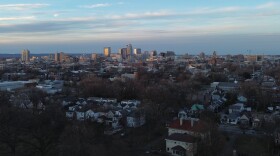This week, we’re participating in a national week of conversation along with other NPR member stations called A Nation Engaged. It’s a coordinated conversation around a topic, and the goal is to get a wide variety of voices answering the same question.
We’re asking: What does it mean to be American? And what could the next president do to advance your vision?
Homeownership is a dream not only of U.S. born citizens but of many who arrive here from other countries. In Kentucky, more than 26,000 immigrants own their homes.
Bhim Koirala, 36, is giving a tour of his three bedroom home in Louisville. As he walks around, the wooden floors creek. His wife, Deuka, gets their two kids ready for a community festival about 10 minutes away.
Koirala has owned his home for about a year. His house is about 1,700-square-feet, not including the unfinished basement. In his Hikes Point neighborhood, he’s close to shopping and restaurants, including Kathmandu Kitchen and Bar and Namaste Grocery. And he's a far cry from the cramped refugee camp he stayed in for 18 years in Nepal, a detour from his native Bhutan.
"One of the American dreams is to buy a house," he says. "And buying a house to me also means to be free."
Immigrants contribute up to $5 billion to housing wealth in the state, accordingto the Partnership for a New American Economy.
“One of the things that we know is that immigrants tend to push up the home values, certainly over the long-term but many cases also in the short-term,” says Emily Brandon of Greater Louisville, Inc. Brandon works with workforce and talent initiatives and focuses on Louisville’s global population.
Brandon says when immigrants move in there’s a blossoming of diverse businesses and restaurants. And that can drive economic growth in neighborhoods.
“All of that can really drive the quality of life, the vibrant communities, the walkability of neighborhoods, the people being out and about," she says.
And when immigrants put down roots, it pays off for Americans. A report from the Americas Society and Council of the Americas says that if the U.S. welcomed 100,000 new immigrants each year, housing values would grow by as much as $80 billion annually.
“Once they’re here, they have a positive experience, they’re buying into the American dream," Brandon says. "They are wishing to pursue homeownership and they tend to want to put down roots. This is an opportunity for us.”
Brandon is talking specifically about Louisville, but it could be an opportunity for the Commonwealth as well. About 160,000 immigrants live in the state, or about four percent of the population. An increase in the state’s population could mean more economic growth, not just in homeownership, but in entrepreneurship, education, tax contributions and the workforce.
Koirala is also a member of the Bhutanese Society of Kentucky. They meet on Thursdays at the Buechel Park Baptist Church. One of the other members, Vinod Poudel, says he associates homeownership with identity.
“I believe, like among many Bhutanese, it’s that theme of identity,” Poudel says. “We lost our homes in Bhutan. We lost our identity and became refugees. So after coming to the U.S., being able to buy your home is, I think, a regaining of our self identity.”







